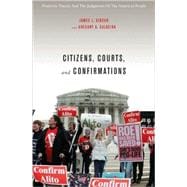
Note: Supplemental materials are not guaranteed with Rental or Used book purchases.
Purchase Benefits
What is included with this book?
| List of Figures and Tables | p. ix |
| Preface | p. xi |
| Introduction: The Public and Supreme Court Nominations | p. 1 |
| Changes in Attitudes toward Judicial Institutions | p. 4 |
| The Theory of Positivity Bias | p. 7 |
| Outlining the Chapters That Follow | p. 14 |
| Knowing about Courts | p. 17 |
| Assessing Public Information about Law and Courts | p. 19 |
| Empirical Evidence of Mass Ignorance | p. 20 |
| Discussion and Concluding Comments | p. 34 |
| Appendix 2.A: Survey Design, The 2001 Survey | p. 35 |
| The Popular Legitimacy of the United States Supreme Court | p. 36 |
| Theories of Institutional Legitimacy | p. 38 |
| Measuring Institutional Legitimacy | p. 44 |
| Accounting for Individual-Level Variability in Institutional Loyalty | p. 49 |
| Discussion | p. 61 |
| Institutional Loyalty, Positivity Bias, and the Alito Nomination | p. 63 |
| The Confirmation of Samuel Alito to the Supreme Court | p. 66 |
| The Positivity Theory Hypotheses | p. 69 |
| Assessments of the Confirmation Process | p. 71 |
| The Models | p. 72 |
| Determinants of Confirmation Preferences | p. 85 |
| Discussion and Concluding Comments | p. 93 |
| A Dynamic Test of the Positivity Bias Hypothesis | p. 96 |
| Applying the Theory of Positivity Bias to Confirmations | p. 97 |
| Measuring Change in Attitudes toward the U.S. Supreme Court | p. 98 |
| The Model of Change in Institutional Support | p. 103 |
| Findings | p. 110 |
| Discussion and Concluding Comments | p. 119 |
| Concluding Thoughts, Theory, and Policy | p. 121 |
| Caveats, Puzzles, and Questions | p. 125 |
| Survey Design: The 2005 Survey | p. 129 |
| The Representativeness of the Panel Sample | p. 131 |
| The Supreme Court and the U.S. Presidential Election of 2000: Wounds, Self-Inflicted or Otherwise? | p. 133 |
| The Theory of Institutional Legitimacy | p. 135 |
| Institutional Loyalty in the Aftermath of the Election | p. 139 |
| Views of the Court's Opinion in Bush v. Gore | p. 144 |
| Discussion and Concluding Comments | p. 156 |
| Survey Design | p. 158 |
| Measurement | p. 159 |
| References | p. 163 |
| Index | p. 175 |
| Table of Contents provided by Ingram. All Rights Reserved. |
The New copy of this book will include any supplemental materials advertised. Please check the title of the book to determine if it should include any access cards, study guides, lab manuals, CDs, etc.
The Used, Rental and eBook copies of this book are not guaranteed to include any supplemental materials. Typically, only the book itself is included. This is true even if the title states it includes any access cards, study guides, lab manuals, CDs, etc.